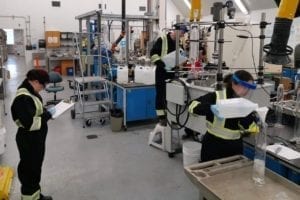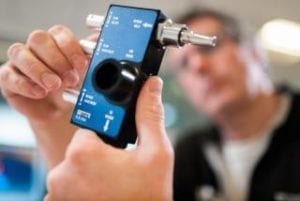The global COVID-19 pandemic has resulted in shortages of critical supplies, and many universities are contributing their expertise and technical facilities to improve the availability and performance of critical healthcare supplies, including Purdue, University of Idaho, Nelson Mandela University and many more.
Researchers from the University of Saskatchewan (USask; www.usask.ca) and three local companies are helping to address a provincial shortage of hand sanitizer using a bioprocessing facility on the USask campus to temporarily produce sanitizer and key ingredients, while the business group gears up for larger-scale production.

Researchers working at the USask Bioprocessing Pilot Plant. (Photo: University of Saskatchewan)
The USask Bioprocessing Pilot Plant was producing hand sanitizer—up to 400 bottles a day—until a week ago when local firm Bioriginal Food & Science Corp., secured a license to set up its own manufacturing facility to produce the hand sanitizer in larger quantities. As the business group lead, Bioriginal is selling the sanitizer to the Saskatchewan Health Authority at a discounted price to help protect health-care workers from COVID-19.
Over the past couple of weeks, USask researcher Martin Reaney has been working with the three companies—including a USask spin-off led by Reaney himself—to formulate sanitizing products, verify quality, and produce hand sanitizer at the bioprocessing facility using a standard, government-approved formula, followed by two additional new preparations. USask has also played a pivotal role in the production process design, application for licenses, and implementation of testing protocols.
Reaney, chief executive officer of USask spin-off Prairie Tide Diversified, said his lab and Prairie Tide have been working with the Saskatchewan Structural Sciences Centre on the verification analysis.
Bioriginal, which rapidly invested in specialized packaging equipment, fronted the costs of the product ingredients and quality verification analytics. The firm has obtained federal Natural Products Numbers (NPN) so that three sanitizer products—a sanitizing gel for hands, a surface sanitizer that replaces rubbing alcohol for medical uses, and a workplace sanitizer for equipment—can be sold as licensed products deemed safe, effective and of high quality. The products are sold under the name BioTide.
A key ingredient—ethanol—is being produced by Lanigan firm Pound-Maker Agventures Ltd., which runs an integrated feedlot and fuel ethanol facility. The USask Bioprocessing Pilot Plant is equipped to deal with flammable materials so is ideally suited to work with ethanol, Reaney noted.
Unique to Western Canada, the USask Bioprocessing Pilot Plant has industrial-grade scientific equipment designed to isolate and extract compounds from various plants and crops for commercial applications in areas such as biofuels, crop development, and natural health products. Co-operative research and development with industry partners is a mandate of the facility. Reaney’s team and collaborators from across campus plan to apply for federal, provincial and industrial funding to undertake related research projects.
Universities are also contributing their abilities to improve the availability and performance of personal protective equipment (PPE). For instance, an interdisciplinary team of engineers from Rensselaer Polytechnic Institute (RPI; Troy, N.Y.; www.rpi.edu) was recently awarded National Science Foundation Rapid Response Research (RAPID) grant, under which two Rensselaer researchers plan to examine ways to equip N95 respirator masks with antiviral properties and the ability to withstand sterilization. These improvements would better protect health care workers and enable the current supply of masks to last longer.
N95 masks are designed using very small electrostatically charged fibers that help prevent aerosolized droplets of the virus from penetrating through the mask material. The design, while effective, doesn’t lend itself to disinfection and reuse, further exacerbating the effects of a limited supply.
“They are designed to be taken off and thrown away immediately after you’ve seen a patient,” said Helen Zha, an assistant professor of chemical and biological engineering and a member of the Center for Biotechnology and Interdisciplinary Studies at Rensselaer (CBIS). “The idea we have in mind is to develop a process where someone in the hospital can apply a very thin coating of an inexpensive polymer material to the mask stock that they already have, that will give it antiviral properties and also enable sterilization procedures.”
“Our proposed technology would make the mask self-disinfect by inactivating viral particles on contact. If successful, such a technology might enable health care workers to safely use the same mask for longer periods of time,” said Edmund Palermo, an assistant professor of materials science and engineering and a member of the Center for Materials, Devices, and Integrated Systems(cMDIS) at Rensselaer.
Zha’s expertise in making ultrathin protein and polymer coatings on surfaces, combined with Palermo’s expertise in antimicrobial polymers, form an ideal partnership for this research effort.
“The COVID-19 pandemic has highlighted a multitude of multidisciplinary challenges that CBIS and cMDIS at Rensselaer are uniquely positioned to tackle together in partnership,” said Deepak Vashishth, the director of CBIS. “This type of engineering solution to a human health problem could make a vast difference in the worldwide effort to protect medical workers.”
Together, the team will examine which commercially available, highly charged polymers could deactivate viruses like the one that causes COVID-19, increase the mask’s barrier to the virus, and maintain the protective properties of the mask through sterilization — all while preserving breathability. The researchers are targeting reagents that are readily available and nontoxic, in an effort to make the method they develop safe and easily deployable on a global scale.
Once their research is complete, Zha and Palermo will work with a team at Mount Sinai to deploy this coating in order to confirm its feasibility in a hospital setting. The team will then share its findings with other researchers and the public through open accessible channels.
“As soon as we can have modified masks validated and certified, we hope to disseminate a DIY kit for application of the coating to existing masks,” Palermo said.
“We want the information to be widely accessible, so that other people, whether they’re in Brazil, or India, or somewhere else in this country, can potentially do this themselves,” Zha said.
The RAPID funding mechanism is designed to support quick-response research projects during disasters. As the world waits for a vaccine, a solution like this could reduce a critical supply strain while better protecting both health care personnel and the broader public.
In the U.K., a team of University College London (UCL; www.ucl.ac.uk) engineers, University College London Hospital (UCLH) clinicians and industry partners Mercedes-AMG High Performance Powertrains have developed a breathing aid that can help keep Covid-19 patients out of intensive care. See below for information on accessing the devices and designs.

A new breathing device from UCL and its industry partners has received regulatory approval (Source: UCL)
The breathing aid, known as Continuous Positive Airway Pressure (CPAP), has been used extensively in hospitals in Italy and China to help Covid-19 patients with serious respiratory problems to breathe more easily, when oxygen via a face mask alone is insufficient.
The device UCL produced, called UCL-Ventura, has gained regulatory approval and the Department of Health and Social Care has now placed an order for up to 10,000. UCL says it has conducted successful patient trials at UCLH and sister hospitals, and are now working to produce and dispatch our devices to the NHS hospital network. We have also refined and modified the device to create a Mark II version, which has shown up to 70% reduced oxygen consumption in healthy volunteer assessments. To help meet international need, UCL has released the designs and manufacturing instructions for free to governments, industry manufacturers, academics and health experts across the globe.
This project is a collaboration between UCL Mechanical Engineering, UCL Institute of Healthcare Engineering, University College London Hospital (UCLH) and Mercedes-AMG High Performance Powertrains. Industrial manufacturer Spirax Sarco is also contributing its manufacturing capabilities to produce important components for UCL’s work.